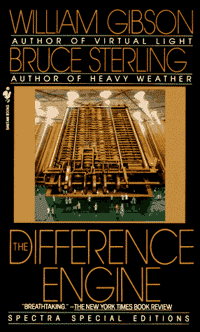Allana: Well, at least we've pinned down our respective characters.
Bill: Yes, it helps me greatly to understand your approach to the book. Most of the experience of fiction, to me, takes place below the level of style -- mostly I react to it like I'm getting a glimpse into the way the author thinks: do they have clever, surprising thoughts? Do they think about things in ways I haven't? I tend to like authors that do that, authors with whom I feel like I'm in a surprising conversation, as I work my way through their books.
Allana: See? This is what I was talking about in one of my first Known Issues, about criticizing music -- you have to figure out whether you identify with the writer, and if you don't, then just know to do the opposite of what they recommend. Now our readers can just pick whichever one of us they agree with more. Simple!
Bill: Yes, we'll need to design warning icons to signal to casual readers which approach each of us are taking. Sort of like those triangular caution signs Warren Ellis has been playing with in Doktor Sleepless.
Allana: There's nothing so different between us as far as "think[ing] about things in ways I haven't." But what I get off on is having people describe things I've never thought to describe, in words I wish I would've used had I done so. I like being blown away by the mundanity of human experience, but also the beauty that can be created in acknowledging it. That sounds pretentious, doesn't it?
Bill: Any talk about the experience of art sounds pretentious. I think you just have to dive in and sound pretentious, and not care. Pretentiousness is more a problem of the listener/reader who doesn't want to understand what you mean than it is yours.
Allana: This is true, but I have the critic's naive hope of being universally understood.
Bill: It doesn't hurt to strive for clarity, but I don't think you should tread too cautiously in doing that. And I get what you mean about being blown away by minutiae, and creating beauty in the description of that experience. That's exactly the beauty of "Unweaving the Rainbow" that Richard Dawkins was getting at, in answering the romantic charge that science reduces mysteries to the mundane. It doesn't -- it elevates the mundane into the mysterious. You surely can unweave rainbows, but the structure underneath is more astonishing than the colors. FOR SCIENCE!
Allana: Oh right -- art link.
They're all from the same blog - here's one related to your last sentence:
Bill: Those covers are brilliant!
Allana: And another that made me think "Why didn't I think of that? Why can't I do that?" -- without wasting too much time looking for perfect examples.
Allana: They're geometrical, biological -- that stuff's easy! It's in my brain all the time! Why can't I just see the stuff in front of me in the way that would make beautiful art, think about it in words that would make beautiful writing?
Bill: I know exactly that feeling. Have you been watching the remake/remodel threads on Whitechapel? Lately they've got into a lot of art-design styling, and I'm constantly floored, wishing I could intuitively arrange shapes in that way.
Allana: Oh, yeah. Don't even get me started on Lance Sells's sketches in the Dr Sketchy thread. He seems clinically insane, which means I have to meet him.
Bill: I know exactly the sketches you're talking about. Yes, my jaw drops every time he posts one.
Allana: Artists! Guh!
Bill: The thing is, I do enough writing and drawing to at least get where the ability to observe in that way comes from, and to think that maybe, if I could just concentrate on one pursuit long enough, I could approach a similar unique creativity... but still...
Allana: Yeah, precisely. It's the development of one trademark stylistic move that baffles me. I still find the temptation to write in multiple styles, and I just can't outweigh the benefits of being multiversed and adaptable to having that one really finely honed skill.
Bill: And in the realm of music I'm just lost. I can be transported -- I've had what I'd define as out-of-body experiences listening to music, triggered by a certin sound happening at a certain time, and am left in awe, you know? How do they know to put the sounds together that way? How can they feel it? That's a realm of art I stand in abject terror of!
Allana: It's still nice, in the midst of this whole exclusive-subjective-experiences thing the western world is going through, to think that people are so easily united by one powerful artistic experience. Even if we get sick of it a week later. I want to get over that weakness, the art-unites-us-all ideal. But it's hard.
Bill: It's probably fundamentally true. It's coming out of the under-conscious, from weird brainmeat we probably all share.
Allana: So when do we start telling people this is a philosophy blog instead of a literary criticism blog? I guess when we start saying new and controversial things.
Bill: Ha! Yes. If we keep trying, we might get there. Next chat we'll have to start off on non-fiction reading experiences, and see where that takes us.
Allana: That one'll be rough, for me. But I'm willing to give it a shot.
Typogram II Transmission Finis



